As he celebrated FIFA’s decision to award hosting rights for the three opening games of the 2030 World Cup to South America and thanked CONMEBOL head Alejandro Dominguez for efforts, Claudio Tapia, the head of the Argentine Football Association (AFA) paused, turned to the left and looked at Sergio Massa: "There is a huge challenge ahead when it is your turn to lead this country.”
AFA’s Ezeiza training complex, filled with key figures from all levels of the domestic game, began to applaud, in what was the most concrete expression of support that, a week before the elections, no-one hides: the vast majority of national football leaders will vote for the candidate of Unión por la Patria.
"It's out of conviction, but also out of survival," the director of a big club told Perfil, speaking anonymously. Football clubs as private companies are a recurring fear among those who pull the strings of domestic football.
For those who know the daily life of the nation’s leading clubs and the corridors of Viamonte 1366, AFA’s headquarters in Buenos Aires City, what happened at the press conference between Tapia, Massa and Tourism & Sports Minister Matías Lammens, is nothing new: Massa has been building power in Argentine football for years. Sometimes to suit his political strategy, and sometimes because interpersonal relationships allow him to sow support that he now needs to harvest.
The return of Decree 1212, which establishes a special contribution regime for clubs regarding employer contributions and which had been annulled during the 2015-2019 government of Mauricio Macri, should be read along these lines. The measure, which allows tax deductions for activities performed by clubs (particularly those that provide educational services and promote football in impoverished areas) was one of the five demands from the leadership since the beginning of Alberto Fernández's administration.
The move was crystallised last week, just in the nick of time, but work has been going on for months to make it a reality. In fact, at the AFA Executive Committee meeting on Tuesday, June 6, AFIP tax agency director Carlos Castagneto and YPF director Santiago Carreras, who for years has acted as a liaison between Kirchnerism and AFA, gave details of the project now confirmed by Lammens.
Massa does not always come to the fore when it comes to football. He has often preferred working in the background, such as when he helped disband the Superliga and bring the organisation of the country's main football tournament back into AFA’s orbit. That took place in January 2020 at his Massa’s home in Tigre, with Tapia, Marcelo Tinelli, Jorge Amor Ameal and Nicolás Russo in attendance.
A photo from that meeting was published by Pablo Toviggino, Tapia's longtime right-hand man and treasurer. With Russo no longer involved at Lanús, Toviggino is Massa's main alter ego when it comes to football. They have been friends for a long time and five years ago, that relationship became a sort of personalised consultancy.
Besides Toviggino, there are other bridges. Tigre, his hometown club, is presided over by Ezequiel Melaraña, a friend and one of the advisors to the economy minister.
Jorge Pablo Brito, of River Plate, inherited the friendship Massa had with his father; Víctor Blanco, of Racing Club, makes his support for the minister explicit in private; at San Lorenzo, Horacio Arreceygor maintains a good dialogue over trade union and political issues.
At Boca Juniors, Massa has carved out two paths: president Jorge Amor Ameal and Juan Román Riquelme, the vice-president and who will try to remain at the club after December, another election of high political tension. With Riquelme, the relationship began due to geographical proximity and intensified due to affinity. In 2015, on Massa’s orders, he was declared an illustrious citizen of Tigre. That "excellent relationship we have with Román", as Malena Galmarini publicly acknowledged (before questioning the Boca legend for his statements about Sebastián Villa and allegations of gender violence), prevails in these days too.
Ameal's relationship with Massa comes through Marcela Durrieu, the mother-in-law of the Frente Renovador leader and Malena's mother, who is a close friend of the wife of the current Boca president.
Of course, within the ecosystem of the football leadership, there will also be obvious and explicit exceptions to the rule. The Buenos Aires Province gubernatorial candidacy of Nestor Grindetti, president of Independiente, for Juntos por el Cambio, or Andrés Fassi, of Talleres, and his ties with the opposition, are the most visible ones.
related news

Ex-team-mates Milito and Verón lead boyhood clubs into Clausura final clash

New development in AFA-Sur Finanzas case as court order searches at Pilar neighbourhood

Police raid offices of Argentina football federation in corruption probe







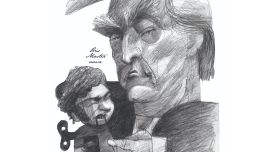








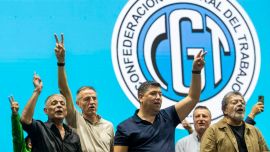

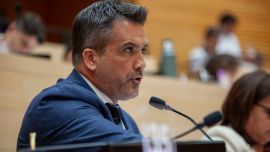
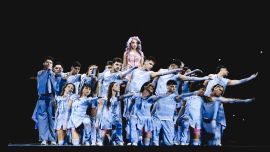
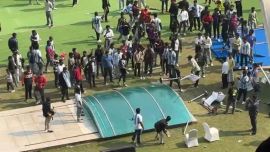
Comments